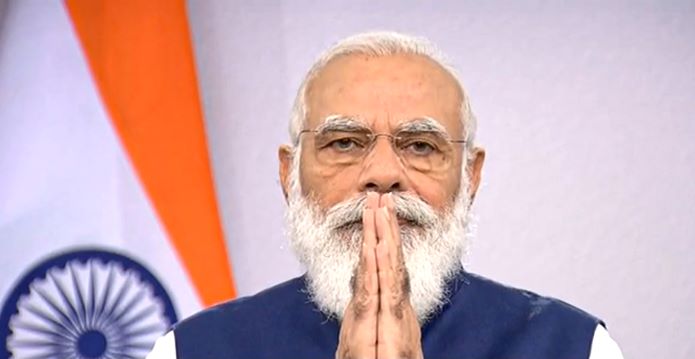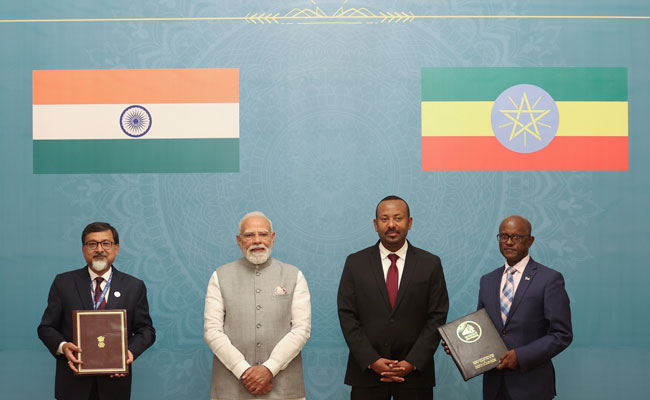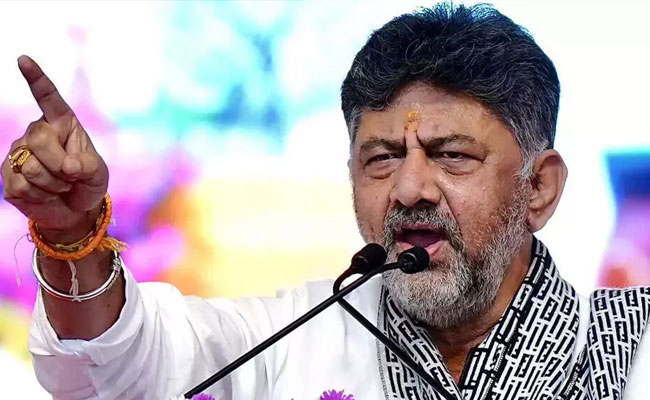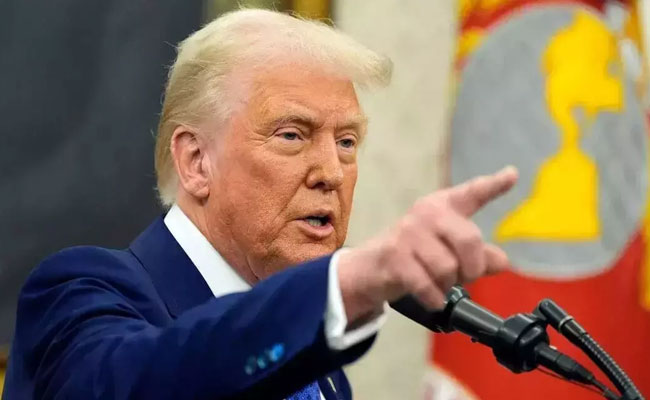United Nations: Prime Minister Narendra Modi on Saturday questioned for how long will India, the world's largest democracy and home to 1.3 billion people, be kept out of the decision-making structures of the United Nations, asserting that reform in the responses, processes and in the very character of the global body is the "need of the hour."
In his pre-recorded video statement to the landmark General Debate of the 75th session of the UN General Assembly, Modi said the stability in the United Nations and empowerment of the world body are essential for the welfare of the world.
The prime minister's strong push for UN reforms and the much-delayed expansion of the powerful Security Council came as India will begin its two-year term as an elected non-permanent member of the 15-member Council from January 1 next year.
"For how long will India be kept out of the decision-making structures of the United Nations? How long would a country have to wait particularly when the transformational changes happening in that country affect a large part of the world?" Modi asked.
He said that while it is a fact that the faith and respect that the United Nations enjoys among the 1.3 billion people in India is "unparalleled", it is also true that the people of India have been waiting for a long time for the process for the reforms of the United Nations to get completed.
"Today, people of India are concerned whether this reform-process will ever reach its logical conclusion," he said, adding that every Indian today, while seeing the contribution of India in the world organisation, aspires for India's expanded role in the United Nations.
"Reform in the responses, in the processes, and in the very character of the United Nations is the need of the hour," he emphasised.
India has been spearheading decades-long efforts to reform the Security Council, saying a structure set up in 1945 does not reflect contemporary realities of the 21st Century and is ill-equipped to handle current challenges.
There is widespread support, including by four out of the five permanent members of the Security Council - US, UK, France and Russia - for a permanent seat for India at the Council.
Modi said India is a country which is the largest democracy of the world, with more than 18 per cent of the world population, has hundreds of languages, dialects, many sects and ideologies, which was a leading global economy for centuries and also endured hundreds of years of foreign rule.
"When we were strong, we were never a threat to the world, when we were weak, we never became a burden on the world, he said.
Modi emphasised that the world of today is a completely different era from the world of 1945 when the global situation, sources-resources, problems-solutions were all quite different.
"With the changing times, if we don't change, then the drive needed to bring change will also get weakened, he said.
An objective assessment of the performance of the United Nations over the last 75 years would yield several stellar achievements but at the same time, there are also several instances that point to the need for a "serious introspection of the work of the United Nations, he said.
"Several terrorist attacks shook the world and rivers of blood have continued to flow by, he said.
"During those times and even today, can we suggest that efforts of the United Nations to tackle these issues were sufficient, he said.
Modi said India will not hesitate to raise its voice against the enemies of humanity, including terrorism, smuggling of illegal weapons, drugs and money-laundering, and will always speak in support of peace, security and prosperity.
"Starting from January next year, India will also fulfill its responsibility as a non-permanent member of the Security Council. I express my gratitude to all fellow member states who have bestowed this trust upon India, he said, referring to the overwhelming support the country received during the election in June.
"As the world's largest democracy, we will bring our years of rich experience for the benefit of the whole world," he added.
Modi underscored that the ideals on which the UN was founded and India's own fundamental philosophy has a lot of commonality and are not different from each other.
"Within the halls of the United Nations, one has often heard the words the world is one family', he said, adding that it is part of India's culture, character and thinking to treat the whole world as one family.
"In the United Nations too, India has always given priority to the welfare of the whole world, he said, outlining that India has sent its brave soldiers to about 50 peacekeeping missions the world over to keep peace and in the course of maintaining peace, has lost the maximum number of its brave soldiers.
"India's experiences, and India's developmental journey marked with its ups and downs will only add to strengthening the path to global welfare, he said.
"In the changed circumstances of the post-pandemic era, we are moving forward with the vision of a Self-reliant India', which will also be a force multiplier for the global economy, he said.
"In its journey towards progress, India wants to learn from the world as well as share its own experiences with the world," Modi added.
This year's high-level UN General Assembly is being held in a largely virtual format due to the coronavirus pandemic.
Earlier, India's Permanent Representative to the UN, T S Tirumurti, introduced Modi's pre-recorded statement from the General Assembly Hall.
Let the Truth be known. If you read VB and like VB, please be a VB Supporter and Help us deliver the Truth to one and all.
Addis Ababa (PTI): India and Ethiopia on Tuesday elevated their historical ties to a strategic partnership, as Prime Minister Narendra Modi held wide-ranging talks with his Ethiopian counterpart Abiy Ahmed Ali during which they discussed issues of bilateral and mutual interest.
Modi, who arrived here from Jordan on his maiden bilateral visit, was accorded a ceremonial welcome at the National Palace ahead of the bilateral talks, reflecting the vibrant India-Ethiopia relations rooted in shared history and a promising future.
"We are elevating India and Ethiopia relations to a strategic partnership. This step will provide new energy, new momentum and new depth to our ties," Prime Minister Modi said during the delegation-level talks.
He thanked PM Ali for his support in India's fight against terrorism. "The support of friendly countries in this struggle against terrorism holds great significance," Modi said.
"Today, we got the opportunity to deliberate on the key aspects of our cooperation, such as economy, innovation, technology, defence, health, capacity-building and multilateral cooperation. I am pleased that today, we have decided to double the student scholarship for Ethiopia in India," Modi said.
Modi said that India and Ethiopia have shared contact, dialogue, and exchange for thousands of years. The two countries, which are rich in languages and traditions, are symbols of unity in diversity, he added.
"Both countries are democratic powers committed to peace and the welfare of humanity. We are co-travellers and partners of the Global South. On international platforms, we have stood shoulder-to-shoulder," he said.
The two sides signed eight MoUs/agreements, including upgrading ties to 'Strategic Partnership', customs cooperation, establishing data center at the Ethiopian Foreign Ministry, UN Peacekeeping training cooperation, debt restructuring under G20, more ICCR scholarships and AI short courses for Ethiopians, and support for maternal and neonatal healthcare.
Modi said the African Union's headquarters in Ethiopia makes the country a meeting point of African diplomacy. "Inspired by the common vision of an inclusive world, in 2023, India ensured that the African Union became a G20 member," he said.
In 2023, during India’s G20 Presidency, the African Union was admitted as a permanent member of the G20.
Modi said that though this is his first visit, he felt a deep sense of belonging and warmth, reflecting the thousands of years of connection between the two countries.
On his part, Prime Minister Ali said the two countries share over thousands of years of connection through trade, diplomacy, education, culture and even in our food and traditions. "These ties continue to shape a deep friendship, collaboration and mutual respect between our people," he said.
"We also appreciate your consistent message that Africa's priorities must lead the partnership. These kinds of dignified, respectful messages for Africa are very important. Mr Prime Minister, keep pushing. That is the type of message we are expecting from all our trusted friends," Ali said.
He said this aligned fully with Ethiopia's development plan - African-owned, African-led, and African-defined.
"Today, we meet with a clear focus to shape a modern partnership, grounded in sovereignty, self-reliance and practical cooperation. Our cooperation is rooted in equality and South-South solidarity," he said.
"Our economy is performing strongly. Last year, we grew 9.2% and this year we are expecting 10.3% GDP growth. Besides GDP growth, our FDI inflow is also rising big time. India is the leading source for our FDI," he said.
"We have more than 615 Indian companies which are investing in Ethiopia. This all gives our cooperation a strong foundation of trust. I think our decision today that we elevate our historic relationship to a strategic relationship is the right decision," he added.
Ethiopia also conferred its highest award - The Great Honour Nishan of Ethiopia - on PM Modi. He is the first global head of state to receive this award.
Prime Minister Modi also went to the Friendship Park and Friendship Square in Addis Ababa with PM Ali.
In a warm and special gesture, PM Modi was earlier received by his Ethiopian counterpart at the airport and accorded a warm and colourful welcome.
"Ethiopia is a nation with great history and vibrant culture," Modi said.
PM Ali informed his Indian counterpart about the varieties of Ethiopian coffee during informal talks.
"At Addis Ababa airport, took part in a traditional Coffee Ceremony with Prime Minister Abiy Ahmed Ali. The ceremony beautifully highlights Ethiopia’s rich heritage," Modi said.
In a unique gesture, the Ethiopian Prime Minister drove Modi to the hotel.
On the way, he took a special initiative of taking PM Modi to the Science Museum and Friendship Park, which was not in the itinerary.
"Gratitude to Prime Minister Abiy Ahmed Ali for showing me glimpses of Ethiopian history and culture at the National Palace Museum in Addis Ababa. It was a powerful reminder of Ethiopia’s rich traditions," Modi said in a post on X.
The Nobel Peace Prize-winning Ethiopian PM’s special gestures show remarkable respect for Modi, sources said.
"Thank you Ethiopia for a welcome that was unforgettable. The Indian community showed remarkable warmth and affection. India-Ethiopia friendship is going to get even more robust in the times to come," Modi said.
When Modi arrived at the hotel, he was warmly welcomed by the members of the Indian community. Local artists performed dances. Some of them danced on the theme of the popular Hindi song 'Aisa Des Hai Mera' to welcome him.
On Wednesday, Modi will address the Joint Session of Parliament and share his thoughts on India's journey as the "Mother of Democracy" and the value that the India-Ethiopia partnership can bring to the Global South.
PM Modi arrived in Ethiopia from Jordan, where he held a one-on-one meeting with King Abdullah II at the Husseiniya Palace on Monday before the delegation-level talks.
India and Jordan also inked MoUs in the fields of culture, renewable energy, water management, digital public infrastructure and twinning arrangement between Petra and Ellora, aimed at giving a major boost to bilateral ties and friendship.
From Ethiopia, Modi will visit Oman on the final leg of this three-nation tour.





